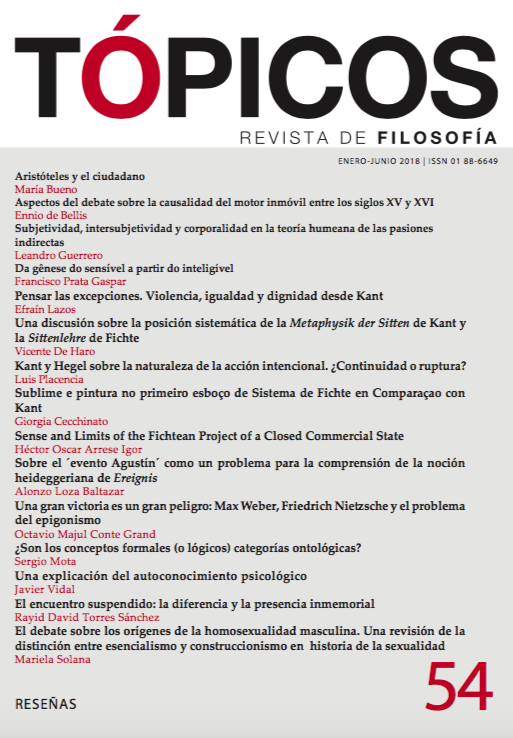Publicado 2017-11-11
Palabras clave
- violencia moral,
- excepcionalidad,
- igualdad moral,
- dignidad,
- Kant
- Constant ...Más
Cómo citar
Resumen
Este ensayo se interroga críticamente por la noción de excepción moral desde una cierta manera de entender la moral categórica de Kant, y en contraste con explicaciones consecuencialistas. No tiene propósitos exegéticos sino sistemáticos. El objetivo general es pensar conjuntamente las nociones de excepcionalidad y violencia morales, así como el papel que en ello juegan los conceptos de igualdad y de dignidad. El trabajo contiene una serie de propuestas entrelazadas: que la violencia moral conlleva una ruptura de la igualdad moral, la cual forma parte de las condiciones de asentimiento de una acción, y que, en ausencia de condiciones de asentimiento, se desvanece, localmente, la vinculatoriedad de los deberes morales. Así, las excepciones pueden entenderse como producto de la ruptura local de las condiciones de asentimiento, sin por ello desacreditar la moralidad como un todo. Por el contrario, las excepciones, adecuadamente entendidas, se hacen con la moralidad y por la moralidad. El trabajo sugiere, asimismo, una noción de dignidad kantiana –como concepto límite, y no como el concepto de una propiedad intrínseca de los agentes—, la cual no sólo es compatible con la idea de igualdad moral propuesta, sino que la complementa; además, contribuye a entender la compleja noción de excepción moral dentro del marco de una moral categórica kantiana.
Referencias
- Bábic, J. (2000). Die Pflicht, nicht zu lügen –eine volkommende, jedoch nicht auch juridische Pflicht. Kant-Studien, 91, 433-446.
- Constant, B. (1797/1988). Des réactions politiques. Paris: Flammarion.
- Gordon, R. (2011). Mainstreaming Terrorism. Oxford: Oxford University Press.
- Hill, T. (1992). Making Exceptions Without Abandonding Principles. En R. G. Frey & Ch. W. Morris. (eds.) Violence, Terrorism and Justice. Cambridge, UK: Cambridge University Press.
- Fourie, C., Schuppert, F. & Wallimann-Helmer, I. (2015). Social Equality: On What It Means To Be Equals. Oxford: Oxford University Press.
- Kant, I. (1797a). Die Metaphysik der Sitten (1797), AA 6: 205-492. [La metafísica de las costumbres. A. Cortina y J. Conill. (trads.) Madrid: Tecnos, 1989.]
- _____ (1797b). Über ein vermeintes Recht aus Menschenliebe zu lügen. [Sobre un presunto derecho a mentir por razones de filantropía. En (1986). Immanuel Kant: Teoría y Práctica. J. M. Palacios, et al. (trads.) Madrid: Tecnos.]
- _____ (1794). Religion innerhalb der Grenzen der blossen Vernunft. AA 6:1-195. (1785). Grundlegung zur Metaphysik der Sitten. AA 4: 387-463. [Kant, I. (1996). Fundamentación de la metafísica de las costumbres. J. Mardomingo. (trad.) Barcelona: Ariel.]
- Korsgaard, Ch. (1986). The Right to Lie: Kant on dealing with Evil. Philosophy and Public Affairs, 15/4, 325-349.
- Lazos, E. (2016). Presentación: Kant y la violencia. En Contextos Kantianos, 3, 253-255. (2014). Reflexiones sobre el terrorismo contemporáneo. En Normatividad, democracia y violencia. L. E. Hoyos. (ed.) Bogotá: Universidad Nacional de Colombia.
- _____ (2010). Devils with Understanding: Two Tensions in Kant´s Practical Philosophy. En Rethinking Kant. Vol. II. P. Muchnik. (ed.) Cambridge, U.K.: Cambridge Publishers.
- Menzer, P. (ed.) (1924). Eine Vorlesung Kants über Ethik. Berlin: Pan Verlag.
- Paton, H. (1954). An Alleged Right to Lie. A Problem in Kantian Ethics. Kant-Studien, 45/1-4, 190-203.
- Pippin, R. (2001). Rigorism and the ‘New Kant’. En Kant un die berliner Aufklärung. Akten des IX Internationalen Kant-Kongresses. Gerhardt, V. et. al. (hrsg.) Band I, Berlin: Walter de Gruyter.
- Primoratz, I. (2013). Terrorism: A Philosophical Investigation. Oxford: Polity.
- Rivera Castro, F. (2014). Virtud, felicidad y religión en la filosofía moral de Kant. México: UNAM.
- Sensen, O. (2009). Kant´s Conception of Human Dignity. En Kant-Studien 100, 309-331.
- Schneewind, J. (1998). The Invention of Autonomy. Cambridge, U.K.: Cambridge University Press.






